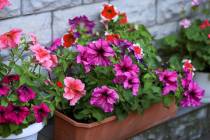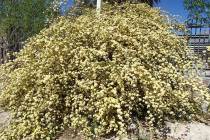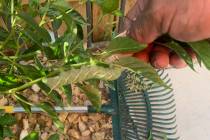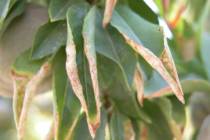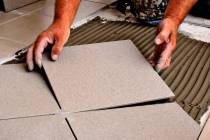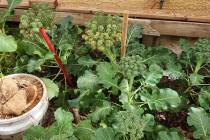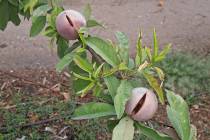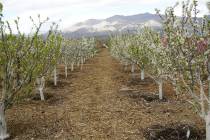Summer means special care for many plants
As we head into the summer doldrums, gardening often becomes a passing thought. But if we plan our activities carefully, a lot can be accomplished to help the landscape. Start early, wear protective clothing and sun screen, and remember to drink lots of liquids. Here is want your plants need to survive the sweltering summer.
Trees and shrubs
Conventional plants like boxwood, mock-orange, and Photinia require deep watering to keep them looking their best. Shallow, light irrigation allows salts to build up in the soil that causes burned leaf margins. If you have a drip or bubbler system, run an extra cycle each week to flush the salts away from the roots. If using spray heads, place a garden hose near the shrub base and allow it to trickle water for 20 minutes before moving it to the next plant.
Do not prune broad-leaf shrubs at this time. Fertilization should not be necessary unless the foliage is showing signs of nutrient deficiency. This might appear as light yellow foliage with darker green veins. In this case, apply a water-soluble fertilizer through a hose-end sprayer to the foliage. Follow all manufacturers' recommendations.
Desert-adapted shrubs such at Texas rangers and cassias will breeze through the summer. Avoid wet feet and large doses of fertilizer on these tough plants as they require very little.
All trees should be watered deeply to help develop wide-spreading and deeper root systems. If you have drip irrigation, simply adjust the controller to allow for an extra cycle. Otherwise, you will have to do this manually by placing a hose on trickle beneath the canopy.
I like to use a soaker attachment that looks a lot like a softball crossed with a colander. It screws on to the end of the hose. Be sure to soak the area out to the drip zone (where the branches end). You can move the hose around while doing other chores. You will find that deep soaking trees provides great benefit during the summer.
Palm trees require more fertilizer than you might think. Use a ready-made product intended for palms, or any complete fertilizer with a good amount of potassium (the last number on the bag).
Also, this is the time to prune off flower stalks. Allowing them to remain creates a lot of litter (flowers and fruit) and takes valuable energy away from the tree. Avoid over-pruning the fronds, as this greatly weakens the tree. If possible, only remove dead leaves, and very few green leaves, if any.
Turf care
Keeping your lawn in good shape during the summer can be a challenge. I recommend the cycle and soak method prescribed by the Southern Nevada Water Authority.
It is really very simple. Water three times every day, one hour apart, for 4 minutes on each station. This allows the water to infiltrate the soil with minimal run-off. Try it, I am sure you will find it works nicely.
In addition, aerate the turf if you missed this chore in the spring. Aerating grass improves water infiltration.
For this job, you can hire a service or rent a unit from a local rental supply. Summer is also a good time to keep your mower in tip-top shape. Blades should be kept sharpened to minimize fraying of the grass blades (dull blades create a silvery cast to the turf).
Fertilize turf sparingly at this time if needed. Keep the nitrogen level minimal (the first number on the bag). The use of a slow-release product is preferred. Lower nitrogen minimizes potential fungus problems.
Last but not least, pull unwanted weeds whenever possible. Remember the old saying, "one year's weeds equals seven years seeds."
Dennis Swartzell is the marketing director for Mountain States Wholesale Nursery. As an ISA board-certified master arborist and a member of the Southern Nevada Arborist Group, Swartzell has been helping Southern Nevadans with their gardening questions for over 25 years. If you have a question about a particular plant, or a general gardening issue, send them to Swartzell at treemender@cox.net.








